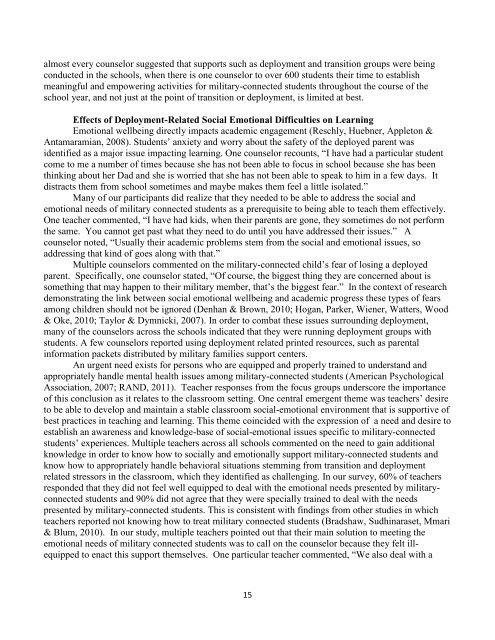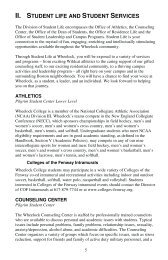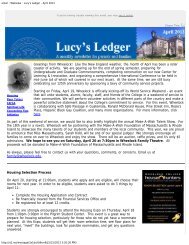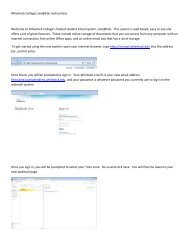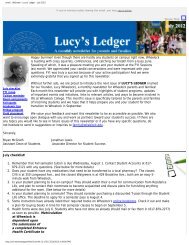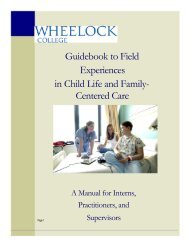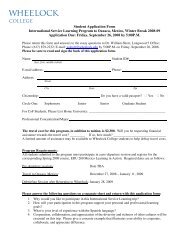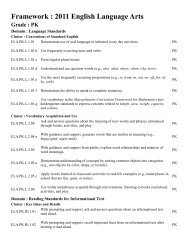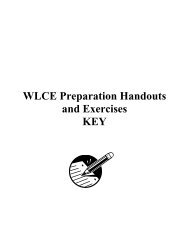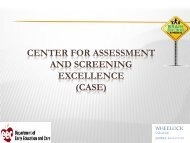Download the study (pdf)
Download the study (pdf)
Download the study (pdf)
Create successful ePaper yourself
Turn your PDF publications into a flip-book with our unique Google optimized e-Paper software.
almost every counselor suggested that supports such as deployment and transition groups were beingconducted in <strong>the</strong> schools, when <strong>the</strong>re is one counselor to over 600 students <strong>the</strong>ir time to establishmeaningful and empowering activities for military-connected students throughout <strong>the</strong> course of <strong>the</strong>school year, and not just at <strong>the</strong> point of transition or deployment, is limited at best.Effects of Deployment-Related Social Emotional Difficulties on LearningEmotional wellbeing directly impacts academic engagement (Reschly, Huebner, Appleton &Antamaramian, 2008). Students’ anxiety and worry about <strong>the</strong> safety of <strong>the</strong> deployed parent wasidentified as a major issue impacting learning. One counselor recounts, “I have had a particular studentcome to me a number of times because she has not been able to focus in school because she has beenthinking about her Dad and she is worried that she has not been able to speak to him in a few days. Itdistracts <strong>the</strong>m from school sometimes and maybe makes <strong>the</strong>m feel a little isolated.”Many of our participants did realize that <strong>the</strong>y needed to be able to address <strong>the</strong> social andemotional needs of military connected students as a prerequisite to being able to teach <strong>the</strong>m effectively.One teacher commented, “I have had kids, when <strong>the</strong>ir parents are gone, <strong>the</strong>y sometimes do not perform<strong>the</strong> same. You cannot get past what <strong>the</strong>y need to do until you have addressed <strong>the</strong>ir issues.” Acounselor noted, “Usually <strong>the</strong>ir academic problems stem from <strong>the</strong> social and emotional issues, soaddressing that kind of goes along with that.”Multiple counselors commented on <strong>the</strong> military-connected child’s fear of losing a deployedparent. Specifically, one counselor stated, “Of course, <strong>the</strong> biggest thing <strong>the</strong>y are concerned about issomething that may happen to <strong>the</strong>ir military member, that’s <strong>the</strong> biggest fear.” In <strong>the</strong> context of researchdemonstrating <strong>the</strong> link between social emotional wellbeing and academic progress <strong>the</strong>se types of fearsamong children should not be ignored (Denhan & Brown, 2010; Hogan, Parker, Wiener, Watters, Wood& Oke, 2010; Taylor & Dymnicki, 2007). In order to combat <strong>the</strong>se issues surrounding deployment,many of <strong>the</strong> counselors across <strong>the</strong> schools indicated that <strong>the</strong>y were running deployment groups withstudents. A few counselors reported using deployment related printed resources, such as parentalinformation packets distributed by military families support centers.An urgent need exists for persons who are equipped and properly trained to understand andappropriately handle mental health issues among military-connected students (American PsychologicalAssociation, 2007; RAND, 2011). Teacher responses from <strong>the</strong> focus groups underscore <strong>the</strong> importanceof this conclusion as it relates to <strong>the</strong> classroom setting. One central emergent <strong>the</strong>me was teachers’ desireto be able to develop and maintain a stable classroom social-emotional environment that is supportive ofbest practices in teaching and learning. This <strong>the</strong>me coincided with <strong>the</strong> expression of a need and desire toestablish an awareness and knowledge-base of social-emotional issues specific to military-connectedstudents’ experiences. Multiple teachers across all schools commented on <strong>the</strong> need to gain additionalknowledge in order to know how to socially and emotionally support military-connected students andknow how to appropriately handle behavioral situations stemming from transition and deploymentrelated stressors in <strong>the</strong> classroom, which <strong>the</strong>y identified as challenging. In our survey, 60% of teachersresponded that <strong>the</strong>y did not feel well equipped to deal with <strong>the</strong> emotional needs presented by militaryconnectedstudents and 90% did not agree that <strong>the</strong>y were specially trained to deal with <strong>the</strong> needspresented by military-connected students. This is consistent with findings from o<strong>the</strong>r studies in whichteachers reported not knowing how to treat military connected students (Bradshaw, Sudhinaraset, Mmari& Blum, 2010). In our <strong>study</strong>, multiple teachers pointed out that <strong>the</strong>ir main solution to meeting <strong>the</strong>emotional needs of military connected students was to call on <strong>the</strong> counselor because <strong>the</strong>y felt illequippedto enact this support <strong>the</strong>mselves. One particular teacher commented, “We also deal with a15


